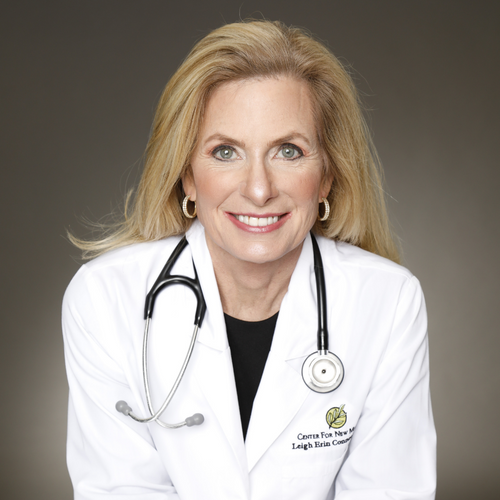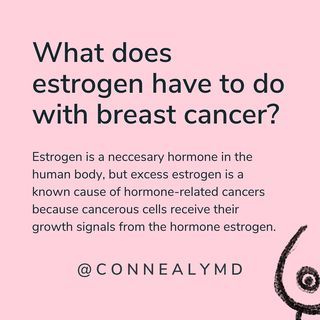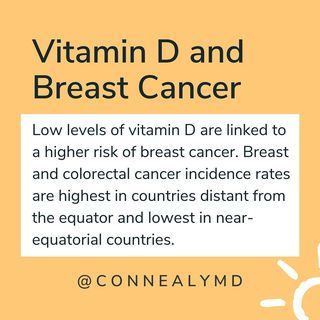Breast cancer was a rare disease in 1900. Today it occurs in epidemic proportions-by some estimates, one in every eight women will contract breast cancer. The key to breast cancer prevention is being aware of the various factors that cause the disease and avoiding them as much as possible while at the same time being aware of what discourages cancerous growth in breast tissue.

The Causes of Breast Cancer
Dr. Leigh Erin Connealy
So What Causes Breast Cancer?
From my clinical experience, it's rarely just one cause. From one cancer cell to a tumor takes about ten years. Imagine a young woman named Sarah. Sarah had scoliosis when she was a young girl, so she received more x-rays than usual. She also grew up eating ultra-processed foods. Then one day, while walking to her car, she fell and landed on her breast. Several years later, during perimenopause, her doctor gave her synthetic hormone therapy. During all that time, she was also working a very stressful job. I often hear some form of this story with new breast cancer patients.
Estrogen Dominance
Estrogen dominance is likely the most important factor when it comes to breast cancer. This is because estrogen can feed many types of cancers and cause them to grow. Is estrogen a "bad" hormone? No, but it can quickly accumulate when the body isn't functioning correctly, and that's when the problems begin. Our bodies can become overloaded with an excess of estrogen and estrogen-like chemicals in tissues. Thus, resulting in impaired fertility, PMS, endometriosis, fibrocystic breasts, miscarriages, problems breastfeeding, and increased risk of estrogen-related cancers. It's important to note that many factors, including nutrition, can cause estrogen dominance. It's vital to eat a healthy diet and avoid ultra-processed foods. Peruse the scientific literature on breast cancer, and you will find that the following nutrients are considered protective against this terrible disease: vitamin C, carotenes, vitamin A, vitamin D, vitamin CoQ10, conjugated linoleic acid (CLA), sphingomyelin, and butyric acid.
Radiation exposure is cumulative, and each dose increases the risk of breast cancer. The more X-rays a woman is exposed to and the higher the radiation dose, the greater risk of breast cancer. Radiation appears to do the most damage in young women with undeveloped breasts. In fact, girls who were exposed to radiation in the bombing of Hiroshima during World War II had double the risk of breast cancer.
Sixteen studies published between 1984 and 2011 found that women identified stress as one of the causes of their breast cancer and the leading cause in five of the studies. Stress hormones can inhibit a process called anoikis, which kills diseased cells and prevents them from spreading. Psychological stress and affective responses, including depression and anxiety, are known to produce neuroendocrine responses that can alter important immune, angiogenic, and inflammatory pathways in cancer development, progression, and control. It's essential to find peace. Our breasts are integral to our emotional health. They have often been deemed the fourth emotional center, which is associated with the ability to express love, joy, grief, and forgiveness, as well as anger and hostility. Therefore, forming loving relationships is beneficial for our breast health. Many women overcome their personal issues with success through meditation, counseling, and even exercise.

📸: @connealymd
Insufficient Iodine
Insufficient iodine can be an issue because iodine is required in breasts, ovaries, and the prostate. Iodine balances estrogen and has a strong anti-breast cancer effect. Animal studies conducted over 40 years ago showed the breast tissue of animals with iodine deficiency developed cancer when the deficiency was not corrected. The same study showed that the risk of breast cancer was directly related to the length of time the iodine deficiency was present.
Medications
Medications like synthetic hormone replacement therapy (HRT) are linked to breast cancer. HRT is likely linked to breast cancer because synthetic hormones are less easily metabolized, which makes your liver work harder. The liver is where estrogen is metabolized.
Synthetic hormones are less easily metabolized — which makes your liver work harder. The liver is where estrogen is metabolized.
Synthetic hormones are not the hormones found in the body.
Synthetic hormones are often not dosed properly.
It's important to note, bioidentical hormone therapy has not been linked to breast cancer.
Excess Iron
Excess iron in the body works as a powerful oxidant, increasing free radicals, thereby raising a woman's risk. Ferritin (a measure of iron storage) stimulates breast cancer cells through an iron-independent mechanism and is localized within tumor-associated macrophages. Iron issues tend to arise when a patient has a history of consuming fortified iron. Flour and pasta almost always contain iron which has been artificially added as ferrous sulfate. Unbound iron accumulation in body tissue has been shown to contribute to breast cancer.

📸: @connealymd
Low Vitamin D
Low vitamin D is one of the most common nutritional deficiencies in breast cancer patients. Studies show breast cancer rates tend to be lowest in regions with high solar radiation and highest in areas with low solar radiation. This effect is probably due to vitamin D status in childhood and early adolescence.
Why? Because Vitamin D plays a substantial supporting role in the immune system. ⠀
Vitamin D:
•Protects against getting 17 different types of cancer. ⠀
•Has been shown to stop cancer cell growth. ⠀
•Linked to inhibiting tumor blood vessel growth. ⠀
•Directly involved in killing cancer cells. ⠀
All of these factors are considered part of the environment of the patient. "As we react to unsuitable environments, our internal environments become limiting for our cells, and instead of renewing themselves, repairing damage, and preparing for new challenges, our cells find themselves in blind alleys." - Dr. Ray Peat Ph.D. The good news is our cells are constantly responding to new environments, which means we can be proactive in our breast health. But there's still no magic pill. It's a multifaceted approach to our well-being. Our mind, body, and spirit must be working together to let us thrive.
To learn more about breast cancer prevention, follow Dr. Connealy on Instagram and visit the Center for New Medicine website, and visit FIT4MOM's Instagram to watch our live Q&A with Dr. Connealy.
